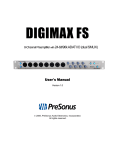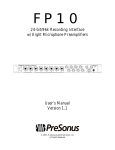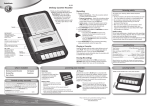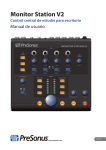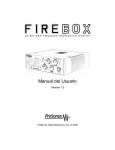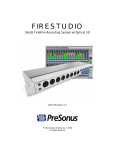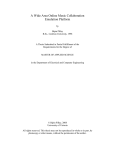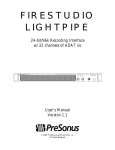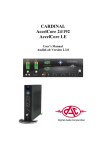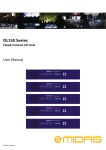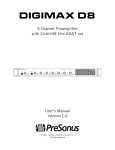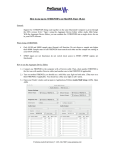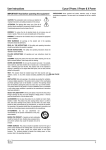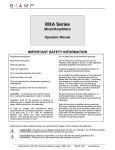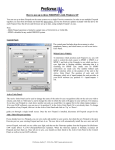Download User's Manual
Transcript
DIGIMAX FS 8-Channel Preamplifier with 24-bit/96k ADAT I/O (dual SMUX) User’s Manual Version 1.0 © 2006, PreSonus Audio Electronics, Incorporated. All rights reserved. W A R R A N T Y PreSonus Limited Warranty PreSonus Audio Electronics Inc. warrants this product to be free of defects in material and workmanship for a period of one year from the date of original retail purchase. This warranty is enforceable only by the original retail purchaser. To be protected by this warranty, the purchaser must complete and return the enclosed warranty card within 14 days of purchase. During the warranty period PreSonus shall, at its sole and absolute option, either repair or replace, free of charge, any product that proves to be defective on inspection by PreSonus or its authorized service representative. To obtain warranty service, the purchaser must first call or write PreSonus at the address and telephone number printed below to obtain a Return Authorization Number and instructions of where to return the unit for service. All inquiries must be accompanied by a description of the problem. All authorized returns must be sent to the PreSonus repair facility postage prepaid, insured and properly packaged. PreSonus reserves the right to update any unit returned for repair. PreSonus reserves the right to change or improve the design of the product at any time without prior notice. This warranty does not cover claims for damage due to abuse, neglect, alteration or attempted repair by unauthorized personnel, and is limited to failures arising during normal use that are due to defects in material or workmanship in the product. Any implied warranties, including implied warranties of merchantability and fitness for a particular purpose, are limited in duration to the length of this limited warranty. Some states do not allow limitations on how long an implied warranty lasts, so the above limitation may not apply to you. In no event will PreSonus be liable for incidental, consequential or other damages resulting from the breach of any express or implied warranty, including, among other things, damage to property, damage based on inconvenience or on loss of use of the product, and, to the extent permitted by law, damages for personal injury. Some states do not allow the exclusion of limitation of incidental or consequential damages, so the above limitation or exclusion may not apply to you. This warranty gives you specific legal rights, and you may also have other rights, which vary form state to state. This warranty only applies to products sold and used in the United States of America. For warranty information in all other countries please refer to your local distributor. PreSonus Audio Electronics, Inc. 7257 Florida Blvd. Baton Rouge, LA 70806 (225) 216-7887 © 2006, PreSonus Audio Electronics, Incorporated. All rights reserved. 1 Overview 1.1 Introduction 4 1.2 Front Panel 5 1.3 Back Panel 6 2 Applications 2.1 Dynamic Microphones 8 2.2 Phantom Powered Microphones 8 2.3 Instrument Input 8 2.4 Connecting and Synchronization 8 2.5 Hook up diagrams 14 3 Technical 3.1 Specifications 15 OVERVIEW 1.1 Introduction Thank you for purchasing the PreSonus DigiMax FS™ 8-Channel Preamplifier with 24bit/96k ADAT I/O (dual SMUX). The DIGIMAX FS is an eight-channel microphone preamplifier, with 24-bit/96k ADAT dual SMUX I/O and word clock I/O. Loaded with direct outputs and inserts on every channel, the DIGIMAX FS is the perfect hardware expansion for your FIRESTUDIO or any digital recording system with optical light pipe expansion capability including DigiDesign’s HD and 002 systems, RME, YAMAHA, Alesis, Mackie and many others. The DIGIMAX FS is also loaded with new patented JetPLL jitter reduction technology ensuring ultra-high converter performance, fast and robust locking through a wide range and variation of frequencies and noise shaping to remove nearly all audio band jitter. PreSonus Audio Electronics is committed to the philosophy of constant product improvement. Our experience has taught us the best way to convert this philosophy into action is by listening to the experts on our gear, our valued customers. We appreciate the support you have shown us through the purchase of this product. Please pay close attention when connecting your DigiMax FS to your system. Bad cables and improper grounding are the most common causes of problems encountered in the recording or sound reinforcement environments. We recommend checking your cables, connections and grounding if you experience any noise or sonic performance problems. Also please scan this manual before hooking up your DigiMax FS to your system to familiarize yourself with its functions and features. Good luck and enjoy your DigiMax FS! 4 OVERVIEW 1.2 Front Panel Class A Mic Pre. Each channel of your DigiMax FS contains a Class A discrete differential input amplifier, providing ultra low noise and wide gain control allowing the DigiMax FS user to boost desirable signal without increasing unwanted background noise. Neutrik Combo Connectors. Each channel of the DigiMax FS has a Mic/Line connector using the Neutrik Combo connector. This revolutionary style connector enables you to use either ¼” phone or XLR connectors in the same female input. The first two channels of the FIREPOD are ¼” instrument and microphone XLR inputs. The line level inputs for these two channels are on the back panel of the DigiMax FS via return 1 & 2. 48V Phantom Power. Channels one through four and five through eight of the DigiMax FS have a 48V Phantom power available in groups. When the Phantom power switch is engaged, power is supplied at a constant rate to that group of preamps, assuring optimum performance of your condenser microphone(s). These switches are located on the far left of the front panel. Sample Rate Selector. The DigiMax FS has a switch on the front panel for sample rate selection (44.1k, 48k, 88.2k, and 96k.) EXT Clock. The external clock switch allows the DigiMax FS to choose an external source for clocking. To switch between ADAT and BNC sync, simply engage the switch again. The switch will light RED for ADAT sync and BLUE for BNC sync. When in either mode, the DigiMax FS will automatically recognize which sampling rate is required for optimum synchronization. 5 OVERVIEW 1.3 Back Panel Note that all inputs and outputs can be use simultaneously. Inserts. The DigiMax FS features insert points for each input. (RING=SEND) This allows any external processing to be done before the output stage on each channel independently. Direct Analog Output. The DigiMax FS has direct analog balanced outputs for each input channel. ADAT Output. This optical ADAT output sends eight channels of digital audio output. The DigiMax FX is capable of sending eight channels at 24-bit/96k sample rate (SMUX). When using sample rates of 44.1K and 48k, all 8 channels are sent out one light pipe output labeled 1-8 just above the light pipe connector. When using 88.2K or 96K sample rate, channels 1-4 are sent out the ADAT light pipe connection labeled 1-4, and channels 5-8 are sent out the ADAT light pipe connection labeled 5-8 (below connector). ADAT Input. This optical ADAT output receives eight channels of digital audio input. The DigiMax FX is capable of receiving eight channels at 24-bit/96k sample rate (SMUX). When using sample rates of 44.1K and 48k, all 8 channels are received into one light pipe input labeled 1-8 just above the light pipe connector. When using 88.2K or 96K sample rate, channels 1-4 are received into the ADAT light pipe connection labeled 1-4, and channels 5-8 are received into the ADAT light pipe connection labeled 5-8 (below connector). DAC Output. (Digital to Analog Converter). Balanced ¼” TRS analog outputs of the converted digital optical ADAT input signals. Converts ADAT optical input to analog output. 6 OVERVIEW BNC In and Out. The BNC input allows an external clock to be connected to the DigiMax FS as a slave. The BNC output allows the DigiMax FS to connect to any BNC input as a master clock. Note that it is not recommended to split the BNC output to clock to multiple devices. It is recommended to daisy-chain multiple DigiMax FS’s or other digital devices. 75 ohm Terminate. This switch allows you to terminate the word clock signal when daisy-chaining multiple digital devices. Press this button on the unit that is the final unit in the chain. 7 2 APPLICATIONS 2.1 Dynamic Microphones Dynamic microphones are characterized by lower output levels. Hence, more gain is needed to amplify a dynamic microphone to operating level. Do not use phantom power when using dynamic microphones. 2.2 Phantom Powered Microphones Phantom powered microphones such as condensors and some ribbon microphones require external power to pre-amplify the microphone acoustic pickup. These microphones typically have much higher output than dynamic microphones. . Channels one through four and five through eight of the DigiMax FS have a 48V Phantom power available in groups. 2.3 Instrument Input The instrument inputs on channels one and two are designed to handle ¼” plugs from instruments such as electric guitars and basses. These instrument inputs are ultra high impedance amplifiers designed to allow the audio potential of an acoustic or electric instrument pickup to be fully realized. Care should be taken not to overdrive these inputs with the signals from instruments with on-board preamplifiers. 2.4 Connecting and Synchronization The DigiMax FS is extremely flexible and can be connected and synchronized in a number of different ways. Since the DigiMax FS has optical light pipe input and output (via dual SMUX and traditional ADAT) you can add either eight analog mic/line inputs to your system AND you can add eight analog line outputs to your system. In any scenario, your system must be synchronized in order to perform properly. Poor synchronization, or an oversight in synchronization settings, is the most common cause of clicks, pops, and other anomalies in the digital studio environment. 8 APPLICATIONS SMUX SMUX, a newer generation of optical light pipe technology, supports sample rates up to 96k and utilizes two optical cables for channels 1-4 and 5-8, respectively. A set up where you are utilizing eight DigiMax FS preamplifiers and converting to digital optical output at 96K sample rate, connect two optical cables (preferably the same length and brand) from the SMUX outputs on the DigiMax FS (channels 1-4 and 5-8) to SMUX inputs on your digital audio workstation or digital mixer. Press the ADAT sync button on the front panel of the DigiMax FS and set your digital audio workstation to sync via optical or SMUX. To synchronize the DigiMax FS via SMUX (dual light pipe) to another device such as a digital mixer, you will need to run two optical cables (preferably of the same length and brand) from the device with the SMUX clock source to the optical inputs 1 and 2 of your DigiMax FS. From the front panel, select ADAT for your external clock source. The DigiMax FS will sync to the word clock within the optical signal coming into it’s optical inputs. To sync another device from the DigiMax FS via SMUX, simply run two optical cables (preferably of the same length and brand) from the DigiMax FS to the device you wish to connect and set the other device to receive External Clock from it’s SMUX dual light pipe inputs. You can do this whether the Digimax FS is set as a word clock master or slave. In the rare situation where SMUX channels 1-4 and 5-8 are coming in from separate devices, it will be important to make sure that all three devices have proper word clock synchronization. The DigiMax FS will read word clock from the first of it’s two optical inputs or from it’s BNC input, or will generate word clock internally, depending on how it is set. It is therefore important for the second SMUX source coming into the DigiMax FS to share the same clock source as the first SMUX source to avoid any word clock problems. This can be done several ways. One way is to sync second SMUX source device to the first SMUX source device via BNC, which will give them both the same identical word clock; and the Digimax FS can be set to external ADAT. Another way is to sync the second SMUX source 9 APPLICATIONS device to the first SMUX source device via BNC, and to sync the first SMUX source device to the DigiMax FS via BNC (or optical) and designate the DigiMax FS as word clock master. A third way would be to set all three devices to external word clock via BNC and to use a master word clock generator and distribution amplifier. ADAT Optical light pipe ADAT is an optical format that supports eight channels of digital audio over optical light pipe. Suported sample rates are 44.1 and 48k. A set up where you are utilizing eight DigiMax FS preamplifiers and converting to digital optical output at 44.1 or 96K sample rate, connect one optical cable from the optical output labled 1-8 on the DigiMax FS to the ADAT optical input on your digital audio workstation or digital mixer. Press the ADAT sync button on the front panel of the DigiMax FS and set your digital audio workstation to sync via optical. To synchronize the DigiMax FS via traditional ADAT light pipe, you will need to run only one optical cable from the device with the ADAT clock source to the optical input #1 of your Digimax FS. From the front panel, select ADAT for your external clock source. The Digimax FS will sync to the word clock within the optical signal coming into it’s first optical input. To sync another device from the DigiMax FS via light pipe, simply run one optical cable from the DigiMax FS to the device you wish to connect and set the other device to receive External Clock from it’s optical inputs. You can do this whether the DigiMax FS is set as a word clock master or slave. 10 APPLICATIONS BNC Sync Many engineers prefer to take care of word clock and audio separately from each other, and you will find BNC cables used to deliver word clock in many quality studios and broadcast facilities worldwide. BNC cables are more rugged, lock into position, and can carry clock signals much farther distances than the standard optical cable. A BNC word clock cable is a 75ohm, shielded coaxial cable with standard ‘twist-lock’ BNC-type connections on each end. To synchronize the DigiMax FS via BNC connector, you will need to run a BNC word clock cable from device with the BNC clock source to the BNC word clock input of your Digimax FS. From the front panel, select BNC for your external clock source. The Digimax FS will sync to the word clock coming into its BNC input. To sync another device from the DigiMax FS via BNC, simply run a BNC cable from the DigiMax FS to the device you wish to connect and set the other device to receive External Clock from its BNC input. You can do this whether the Digimax FS is set as a word clock master or slave. BNC supports all currently available sample rates. Master/Slave discussion The DigiMax FS should perform equally well as a master or slave in most cases, though synchronizing to a poorer quality clock source may affect performance. Not all word clock’s are created equal. As a general rule, many digital devices will sound best on their own internal clock, although there are exceptions; and many engineers believe that a high quality dedicated word clock generator and distribution amplifier can enhance the performance of a device. In a case when two devices need to work together, and assuming that these devices have the available word clock or optical inputs and outputs, the general approach is to determine which device has the best clock to reference from and to designate that device as the word clock master. This is done by carefully listening and A/B testing. We believe that our product makes an excellent word clock master using JetPLL technology. 11 APPLICATIONS Multiple Digital Devices In cases where multiple digital devices are in use, such as multiple DigiMax FS units in conjunction with a digital console, etc., it is important that all devices see the same word clock signal and that the word clock signal is not allowed to attenuate (drop in signal strength). There are two general ways to set up multiple device system. The first is to choose one of the devices in the system to be the word clock master and to slave the other devices to it via BNC. We suggest daisy-chaining from BNC in to BNC out whenever possible as to keep the word clock signal active and avoid attenuation. The use of BNC splitters (‘T’-connectors), and passive BNC ‘thru’ outputs will lower the signal strength and should be avoided when possible. If the last device in the chain happens to be the DigiMax FS, you may ‘terminate’ the line by engaging the word clock terminate button on the back of the DigiMax FS. This helps to stabilize the word clock and keep the word clock signal clean. If the last unit in the chain does not have this feature, you may connect a 75ohm BNC word clock terminator plug to the BNC word clock output of the device. The second approach, and one preferred by many engineers when working in a complex system where more than two digital devices are present, is to use a dedicated high quality master word clock generator and distribution amplifier. These devices generally have multiple BNC outputs which can feed the same clock signal to all of the devices in a system simultaneously. In cases where there are more digital devices in a system than can be fed by a single word clock generator and distribution amplifier, a second word clock distribution amplifier can be slaved to the first one; or the remaining digital devices in the system can be daisy-chained from the devices which are locked to the master word clock generator. Whichever approach one uses, it is always advisable to use good quality BNC cables which are not excessively longer than necessary for the job at hand. It is always good to keep word clock cables separate from AC cable lines or other possible sources of interference. 2.5 Setting up your DAW software Refer to the instructions on external synchronization provided by the hardware manufacturer of the digital audio workstation (DAW) or digital mixer you are connecting your DigiMax FS. As a general rule of thumb, you will need to set your DAW or digital mixer to the same word clock or synchronization as your DigiMax FS. This is usually done in either the hardware’s 12 APPLICATIONS control panel software application and/or your multi-channel recording application. Using the DigiMax FS with Pro Tools Below are instructions on setting up a Digi002 with ProTools LE Software (other ProTools systems with ADAT light pipe input are similar) 1.) Plug in the ADAT cable from the optical output of the DigiMax to the optical input of the Digi002. 2.) ProTools LE: enter the Setups menu > Hardware Setup. Ensure "RCA = S/PDIF, Optical = ADAT" is selected & Clock is set to "ADAT". 13 APPLICATIONS 2.5 Hook Up Diagram 14 3 TECHNICAL 3.1 Technical Specifications Microphone Preamp (XLR Balanced) All measurements Microphone Input to Direct Output Frequency Response (+0,- 0.5dB) Frequency Response (+0/-3.0 dB) Input Impedance THD+N (unwtd, 1KHz @ +4dBu Output, Unity Gain) EIN (unwtd, 55dB Gain, 150 Ohm Input, 20Hz to 22KHz) S/N Ratio (Unity Gain, unwtd, Ref. = +4dBu, 20Hz to 22KHz) Common Mode Rejection Ratio (1KHz, 55dB Gain) Gain Control Range (+/-1dB) Maximum Input Level (Unity Gain, 1KHz @ 0.5% THD+N) Phantom Power (+/- 2VDC) Instrument Input (1/4” TRS, Preamps 1 & 2) Input Impedance Line Inputs (1/4” TRS, Preamps 3 to 8) All measurements Line Input to Direct Output Frequency Response (+0,- 0.5dB) Frequency Response (+0/-3.0 dB) Input Impedance (Balanced) THD+N (unwtd, 1KHz @ +4dBu Output, Unity Gain) S/N Ratio (Unity Gain, unwtd, Ref. = +4dBu, 20Hz to 22KHz) Gain Control Range (+/-1dB) Maximum Input Level (Unity Gain, 1KHz @ 0.5% THD+N) Insert Jacks (1/4” TRS) Send Output Impedance (Unbalanced, Ring) Return Input Impedance (Unbalanced, Tip) Direct Outputs/DAC Outputs (1/4” TRS) Output Impedance (Impedance Balanced) Signal Level LEDs Clip (+/- 0.5dBu) 15 20Hz to 40KHz 20Hz to 100KHz 1600 Ohm < 0.003% -126dBu >101dB >55dB 0dB to 55dB +11dBu +48VDC 1 Mega Ohm 20Hz to 60KHz 20Hz to 150KHz 10 KOhm < 0.0015% >101dB -12dB to +10dB +22dBu 51 Ohm 10KOhm 51Ohm +18dBu TECHNICAL Digital Audio ADC Dynamic Range (Awtd, 48KHz Sample Rate) 107dB DAC Dynamic Range (Awtd, 48KHz Sample Rate) 110dB Bit Depth 24 Reference Level for 0dBFS +18dBu Digital Audio Output (2-Toslink™ Connectors, 8 channels) ADAT/SMUX Digital Audio Input (2-Toslink™ Connectors, 8 channels) ADAT/SMUX Internal Sample Frequency Selections (KHz) 44.1, 48, 88.2, 96 External Sample Frequency Inputs BNC, ADAT (SMUX) BNC Word Clock Output Level (75 Ohm load) 4.5V BNC Word Clock Input Level Range 3.0 to 5.5V Power Input Voltage Range 18 to 30VDC Power Requirements (Continuous) 15W DC Input Connector Type = 5.5mm OD/2.5mm ID Barrel, Center Positive External Switching Power Supply 90-230VAC/35W As a commitment to constant improvement, PreSonus Audio Electronics, Inc. reserves the right to change any specification stated herein at any time in the future without notification. 16
















